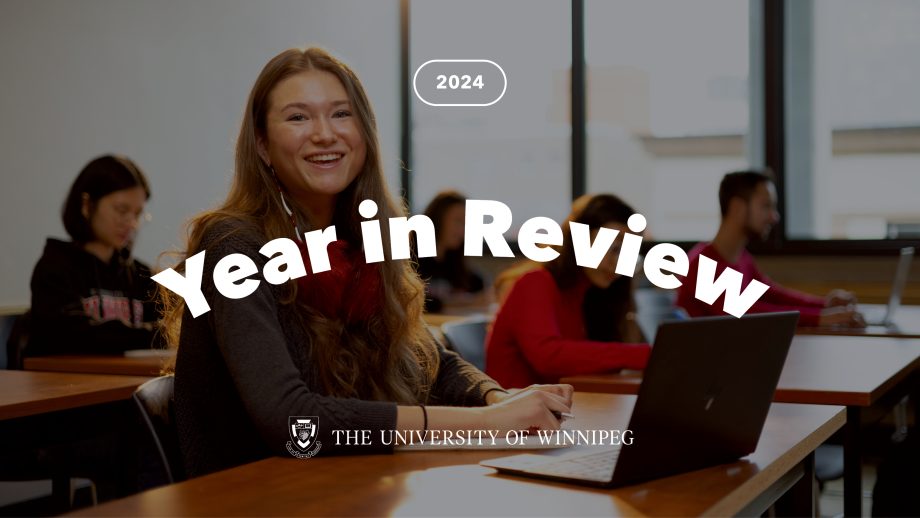Three University of Winnipeg faculty members have each been awarded a $30,000 Social Sciences and Humanities Research Council (SSHRC) Knowledge Synthesis Grant, which are awarded under various themes.
The grants are intended to support the synthesis of existing research knowledge and identify knowledge gaps. They will help identify roles that the academic, public, private and not-for-profit sectors, including Indigenous rights holders, can play in developing and implementing robust policies, best practices and tools.
Ryan Bullock
In May 2024, Associate Professor and Canada Research Chair in Human-Environment Interactions, Ryan Bullock, received a Knowledge Synthesis Grant under the theme of Evolving Narratives of Cultures and Histories. The grant will fund the project, Adapting Rural Climate Cultures.
Rural Canada faces many ongoing changes, including an aging population, the outmigration of youth, the settling of new immigrants, all the while receiving less and less supports to provide their community members with essential services.
Rural communities are now also facing major climate-related challenges, including wildfires, droughts and flooding, loss of ice and snow, and record-high temperatures. These changes are leading to losses in cultural practices, knowledge and identities rooted in these rural spaces and communities. These changes are also pressuring communities to adapt.
In order to be effective, climate adaptation must match the cultural diversity of rural residents in Canada. If culture is not considered, there will be barriers to ensuring rural communities are prepared for climatic changes.
This project will advance our understanding of evolving cultures in rural Canada as they relate to climate adaptation. It will inform policy decisions to ensure rural communities are adequately supported as they move towards an increasingly uncertain future.
Sarah Heath
In June 2023, Criminal Justice Instructor, Sarah Heath, received a Knowledge Synthesis Grant under the theme of Shifting Dynamics of Privilege and Marginalization. The grant will fund the project, Communication Intermediaries in the Canadian Criminal Justice System: A Scoping Review.
People with disabilities are more likely to be victims of crime, yet accounts of such victimization may be underestimated due to barriers experienced by people with communication disabilities when trying to disclose abuse.
In the Canadian criminal justice system, an intermediary is someone who supports a witness, victim or accused person to access, understand and navigate the legal and procedural processes, and may provide legal, communication, or mental health-related services through a criminal justice institution or a non-governmental organization.
Communication intermediaries are registered speech language pathologists who are trained to facilitate two-way communication between people with communication disabilities and legal/justice professionals.
They act as neutral officers of the court (like language translators) and provide accommodations needed for those with communication disabilities to have equitable access to the legal and justice system.
Very little case law and documented evidence can be found regarding the use of communication intermediaries in Canada. This project will disseminate information on communication intermediaries to support equitable and inclusive evidence-based decision-making in the Canadian criminal justice system, and will promote further research in the area.
Kevin Walby
In June 2023, Criminal Justice Professor, Kevin Walby, received a Knowledge Synthesis Grant under the theme of Shifting Dynamics of Privilege and Marginalization. The grant will fund the project, Communication Intermediaries in the for the project, Exploring Data Brokers, Surveillance, and Marginalization in the Digital Era.
Data brokering is a multibillion-dollar industry comprising thousands of companies collecting digital trace information on individuals and sharing it with other companies for marketing and other purposes.
The implications for surveillance are massive and the risk of algorithm-based exploitation using artificial intelligence are significant. Yet little social science research has examined data brokers, the technologies that they use, and most consequentially, the implications for understanding marginalization and privilege in the digital world.
The emergence of data brokers and the development of their technologies occurred with little public discussion. Law and policy lag behind in terms of the regulation of data broker practices, and the consequences in terms of marginalization, inequality, profiling, and other nefarious practices need to be better understood in an academic sense and from a legal and policy perspective.
This project will examine existing knowledge and literature on data brokers and related issues, and will contribute to scholarly conversations about privacy law, business and computer ethics, and the regulation of surveillance capitalism in the risk society.
The systematic review will provide some of the first scholarly assessments of data brokers and their practices in Canada, and will help provide new designs and strategies for future research on data brokers and marginalization.





